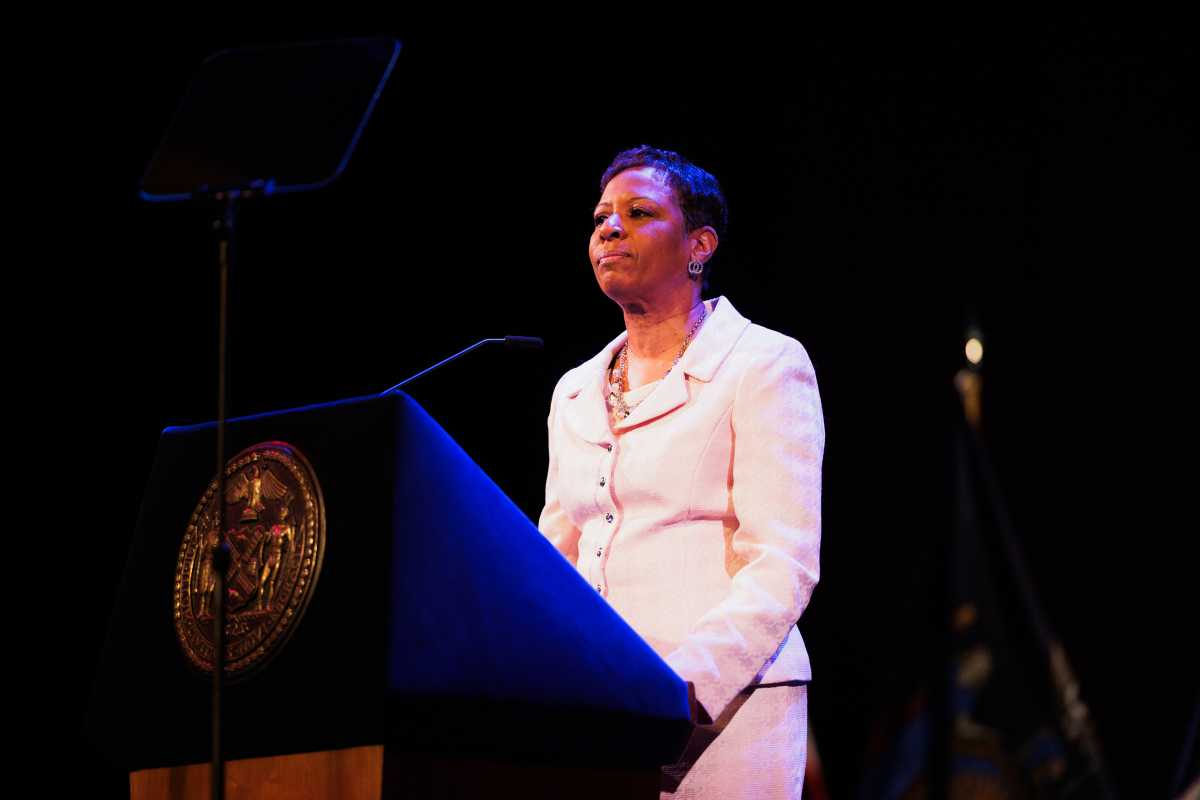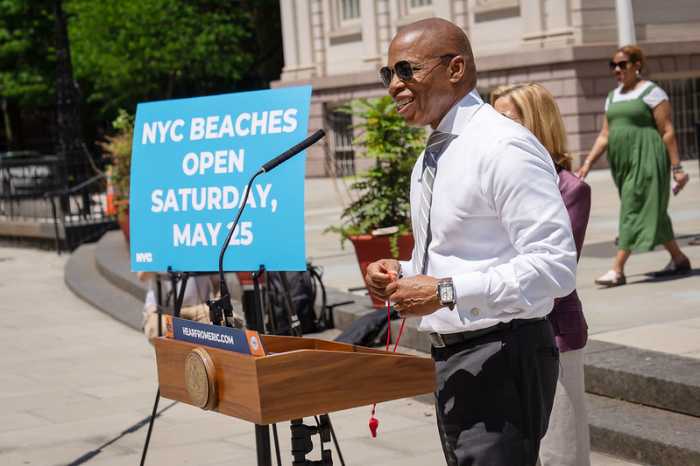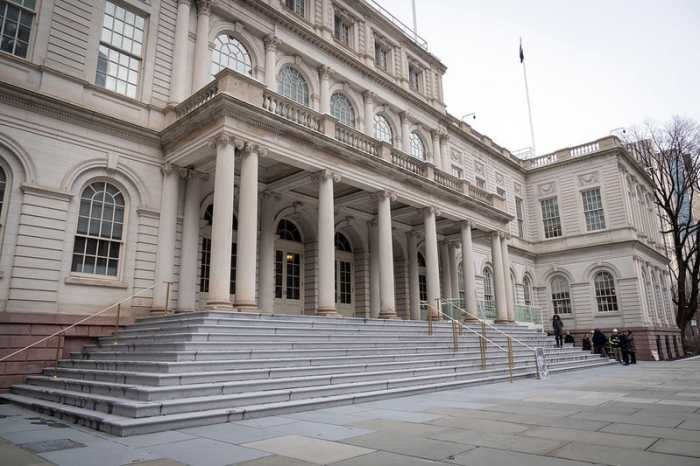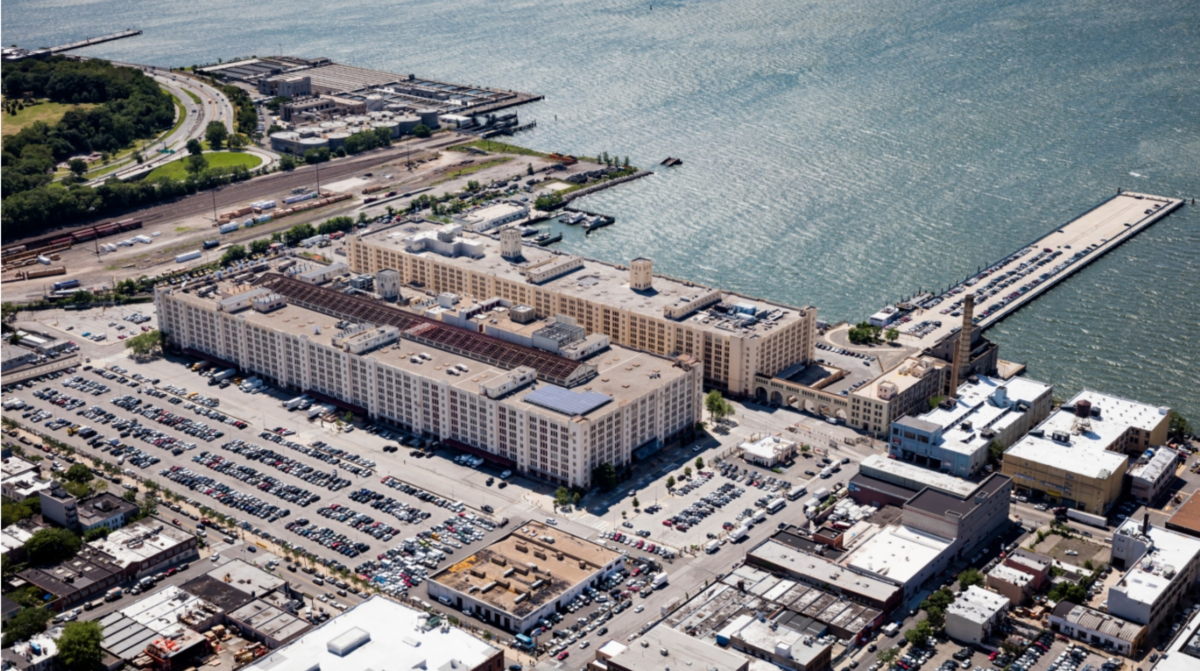Council Speaker Adrienne Adams wants to go “back to basics.”
The speaker’s State of the City speech, which she delivered at the Brooklyn Academy of Music on March 13, focussed on making city government work more effectively for all New Yorkers and taking on the mounting affordability crisis across the five boroughs.
She also presented new proposals like a City Council run effort to track the performance of all city agencies at a granular level and a multi-pronged approach to boosting housing production.
Speaker Adams kicked off her address by painting a dire picture of a city that has become increasingly unlivable for low-income and working class New Yorkers, especially for those in Black and brown communities, in the wake of the COVID-19 pandemic. But she said, with the right policy decisions, that reality could change.
“The pandemic and an unequal recovery have exacerbated economic hardships, while a lack of capacity within our city agencies has undermined access to assistance that families could once rely on,” she said. “This does not have to be our reality. We know our government can work because it has before. We’ve got to get back to basics – strengthen our city government to work for all New Yorkers.”
Rebutting the mayor
The speaker’s top priorities, along with many parts of her address, came across as a rebuke of the way Mayor Eric Adams has governed the Big Apple over the past two plus years.
For instance, the speaker several times referenced a package of laws to expand access to housing vouchers that the council passed last year over the mayor’s veto, which the administration has refused to implement. Additionally, she called for restoring funding to vital city services cut by the mayor over the past year in the upcoming city budget.
She also asserted the council is a “co-equal” branch of government, which has become a common refrain for council leadership as they have expressed frustration over their perception that the administration often runs roughshod over them.
But Mayor Adams, in a statement responding to the address, sought to dispel that idea by painting a picture of collaborative success between his administration and the council.
““For two years, our administration has worked in partnership with Speaker Adams and the City Council to make New York a safer, more prosperous, and more livable city,” he said. “The priorities the speaker laid out today are our shared priorities: child care, housing, women’s health care, and more.”

Improving city government
When it comes to improving the workings of city government, the speaker said “years of understaffing and underinvestment have weakened critical agencies, leaving them unable to adequately support New Yorkers.”
To remedy this, she proposed a career program in partnership with the city’s largest municipal union, District Council 37 (DC37), that would act as a pipeline for low income New Yorkers to fill vacant city jobs. The program would also provide seasonal job opportunities for those who are “chronically underemployed” to gain job experience.
“By providing a seamless transition from education to civil service careers and opening doors for underemployed communities, this program holds promise to be an engine of economic opportunity and upward mobility for New Yorkers of all backgrounds,” said DC37 Executive Director Henry Garrido, in a statement.
Furthermore, the speaker revealed the council will begin tracking the performance of city agencies, some of which have lagged during Mayor Adams’ tenure, with a new “report card” that will be issued for each department.
While it may appear duplicative of the Mayor’s Management Report, released twice a year by City Hall, the speaker contends that compilation of city agency data is not providing the “full picture” of how well government is serving New Yorkers.
The council will also pursue legislation requiring the city Department of Transportation to track progress on projects that fall under its Streets Master Plan, passed by the council in 2019, which requires the agency complete construction on a certain number of bike and bus lanes each year. The tracker appears to be a response to the Adams administration’s failure to meet benchmarks legally mandated by the plan for the past two years.

Speaker Adams said these measures are part of ensuring the laws the council passes are effectively enacted.
“As a co-equal branch of government, our duty is to turn these ideas into effective laws and to conduct oversight,” the speaker said. “But laws and policies are only as good as their implementation.”
Speaker Adams also urged the mayor to reverse budget cuts across vital city agencies and services, including cultural institutions, the city’s three public library systems and the Department of Education’s Universal Pre-K and 3-K programs.
While the mayor has reversed some of the 5% cuts across city agencies that he made in November, many still stand, in addition to another round he enacted in January. While the administration has so far not committed to reversing any more cuts, the mayor’s budget director, Jacques Jiha, left the door open for the possibility of more restorations during a recent council hearing.
Housing production
The speaker also put forward several proposals to boost housing production as the city faces an acute housing crisis reflected in its record low 1.4% vacancy rate.
The speaker, in line with her Fair Housing Framework legislation to push every neighborhood across the city to “equitably” contribute to building housing, offered up sites in her own southeast Queens district she said are ripe for constructing new homes. Those include the 172-acre state-owned Aqueduct Racetrack, which is due to close in three to four years, and an adjacent vacant parcel of city-owned land.
“This presents a generational opportunity to transform this site into housing and homeownership, to transform it into open space and new community amenities,” she said.
She also proposed working with the city’s three public library systems to build housing atop their branches and on other city-owned land.
“By building homes connected to the pillars of our communities, we can create self-sufficient ecosystems that enable all of us to thrive – together,” the speaker said.

Speaker Adams also signaled support for Mayor Adams’ suite of reforms aimed at loosening decades-old city zoning rules to spur housing production — known as the “City of Yes for Housing Opportunity.” But she said her support for the plan, which will come before the council for approval later this year, is tied to deepening affordability levels in new housing projects.
Rachel Fee, head of the New York Housing Conference, applauded the speaker’s proposals for creating more affordable housing.
“New York City’s ongoing affordability crisis has resulted in record low housing vacancy rates and record high rates of New Yorkers being rent-burdened, even forcing longtime residents to leave our city,” Fee said. “We need more deeply affordable housing and we need more affordable homeownership opportunities. The speaker’s proposals demonstrate strong leadership to help meet the moment on the housing crisis,”
Read more: Mayor Pushes Mental Health Reform After A Train Incident




































